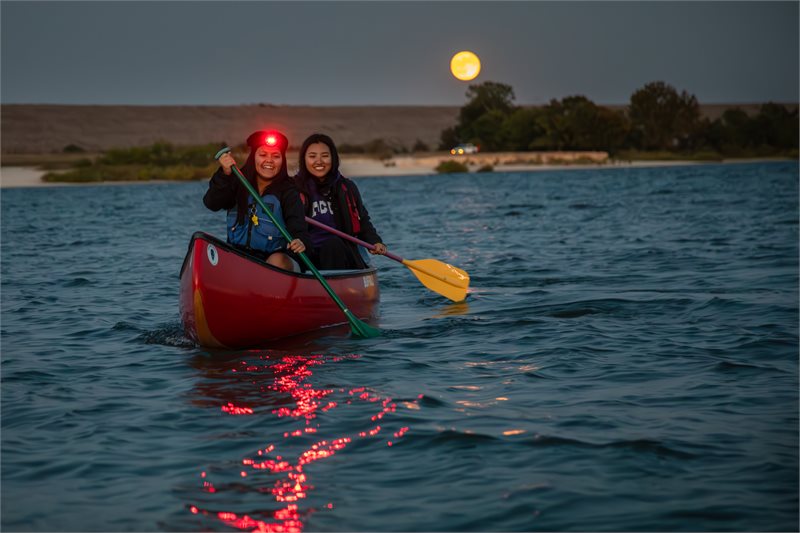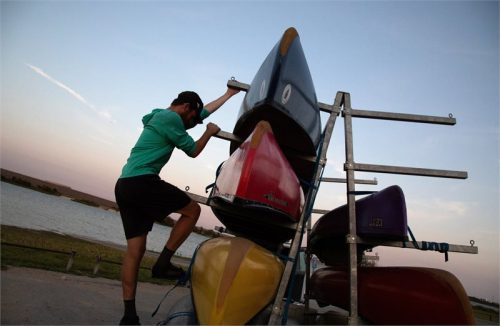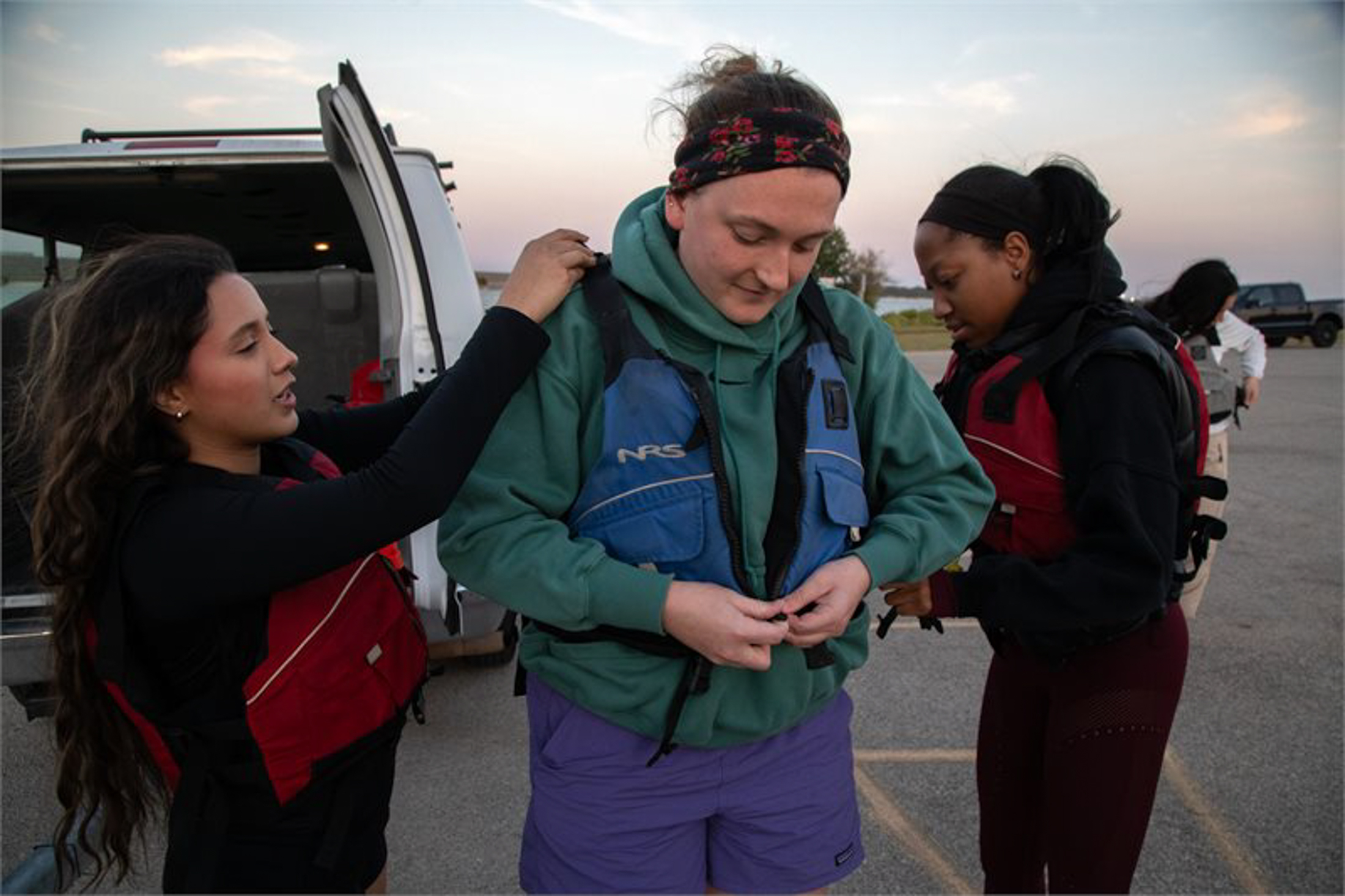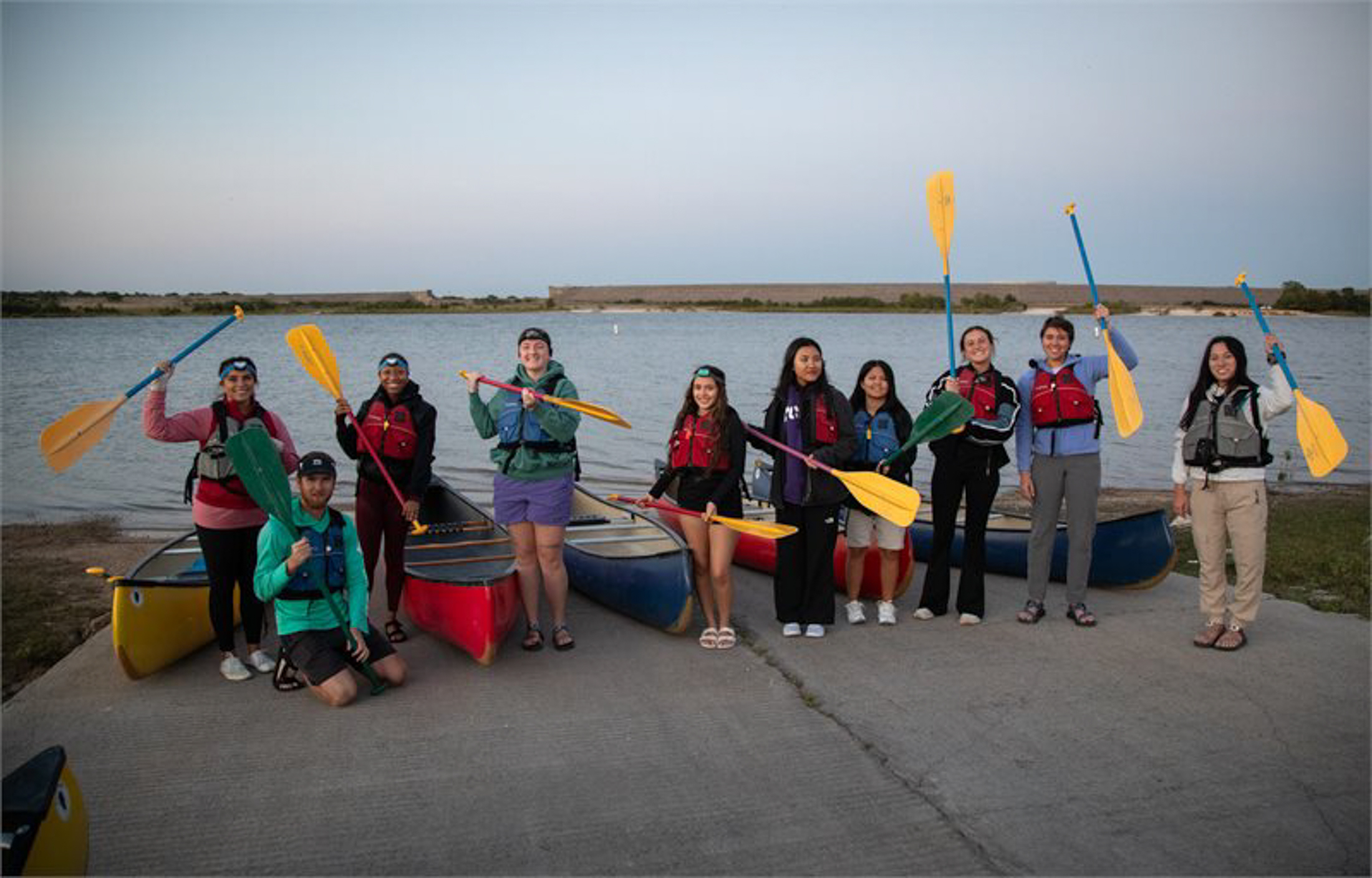
Thiam Kim, left, and Niang Kim paddle as the moon rises over Benbrook Lake. The Full Moon Paddle program is one of many student initiatives offered by Campus Recreation & Wellness Promotion.
Full Moon Magic
TCU’s Full Moon Paddle takes student wellness onto the water.
On a blustery evening last October, 10 TCU students shuffled into a 12-seat van tacked to a trailer hauling canoes. Forty minutes later, right after the sun tucked below the black willows bordering Benbrook Lake, they stood chatting beside a boat launch.
“The person in the back of the boat is the steerer,” James Brandt, a senior horn performance major from League City, Texas, explained to his fellow students, who were outfitted in life jackets, helmets and headlamps. “When you paddle left, you go right. When you paddle right, you go left.”
Brandt, one of three student leaders on the outing, was relaying the safety protocols for the night’s Full Moon Paddle, a staple of TCU Campus Recreation’s adventure trip program.

James Brandt unloads canoes for a Full Moon Paddle on Benbrook Lake.
Another group leader, senior Lindsey Bliss, a psychology major from Orinda, California, said she considers herself a longtime outdoors enthusiast.
Having spent part of her childhood in Bend, Oregon, Bliss gravitated toward TCU Campus Recreation’s outdoor adventure scene after a fall break trip to Buffalo National River in northern Arkansas.
After seven-plus hours on the road, Bliss said, the trip’s dozen participants were greeted at their riverside campsite by a cluster of frogs. Temperatures dipped into the 40s — 50 degrees different from Fort Worth. Bliss said the group was “putting on every single T-shirt we brought, trying to bundle up as much as possible.”
The next day, the campers set out on a hike.
“I had never been to Arkansas before,” Bliss said. “We came around this bend that put us on a cliff that overlooked the valley. I remember there being so many green trees and a forest for as far as I could see.”
When the group returned to camp, the students, many of whom were first-years, let their guards down.
“We went around asking people about the highs and lows of the semester,” Bliss said. “And I remember a lot of the freshmen saying they were homesick. But they were glad to be doing something to meet more people. And I think opening up like that made everyone feel more bonded.”
“The overarching goals and the reason that outdoor programs exist is to give students an opportunity to disconnect from their normal life, to put their phones down for a couple of hours or a whole weekend and engage with the people around them,” said Emily Tumilty, TCU’s coordinator of outdoor programs. “When you step outside of your normal environments, you recognize things about yourself and others you don’t see on the day-to-day.”
For Bliss, joining the adventure trip program allowed her to reclaim a relationship with the great outdoors, something she said had been lacking since she’d moved from the Bay Area.
“This program is a good way to find those places to connect to nature, be outside,” Bliss said, “and find people who share common interests with you.”

Horned Frogs gear up ahead of an October Full Moon Paddle.
A FULL HISTORY
TCU has hosted multiday trips since the University Recreation Center opened in 2003.
In the program’s early years, students visited Texas destinations, including the Brazos River, Enchanted Rock and Palo Duro Canyon. But by fall 2011, attendance on overnight excursions started to dwindle, said Jay Iorizzo ’21 EdD, director of Campus Recreation & Wellness Promotion.
“Where we are geographically,” he said, “we’re not necessarily in the mecca of outdoor pursuit opportunities compared to a Colorado or Northern California.”
Campus Recreation staff wanted to reinvigorate its outdoor adventure program, Iorizzo said, because of its impact on students. “The reward is probably the highest out of the programs we offer through our department.”
Iorizzo and his team had to get creative. Thus, they came up with the Full Moon Paddle.
“This was a great idea that kept people local and connected to the community. Why not take advantage of what we have in our backyard?”
Jay Iorizzo
“This was a great idea that kept people local and connected to the community,” said Iorizzo, who has been with TCU since 2004. “Why not take advantage of what we have in our backyard?”
In 2011, organizers launched the first paddles along a section of the Trinity River’s West Fork, the 145-mile branch flowing southeast from Archer County to the Clear Fork in Fort Worth.
“Being in the Trinity and seeing downtown under a full moon was pretty cool,” Iorizzo said. However, the river ride brought logistical complications, with the one-way paddle necessitating pickup by a staff member.
A half-decade ago, the outing moved to Benbrook Lake, where there are calm waters and unimpeded views of the glowing moon.
“We have people who have been canoeing their whole lives, and then you also get people who have never even seen a canoe,” Bliss said. “Everyone is welcome.”
Iorizzo said the paddle program is unique, as many traditional university outdoor programs require extensive travel from campus.
“If you’re nervous about getting in a van with a bunch of people that you don’t know and driving to an off-site location, Benbrook Lake is 25 minutes away,” Tumilty said. “So it’s pretty low-risk in the realm of, ‘I’m putting myself in an environment with people I don’t know.’ ”
The monthly trip consumes 3 1/2 hours, but Iorizzo said the program aims to instill a longer-term appreciation for the outdoors.
“The hope would be that a student gets exposed to a trip like this, enjoys it, maybe continues on future trips but then also takes advantage and does it on their own time,” he said.

These students are among the roughly 200 who participate in TCU’s outdoor adventure trips each year. “Everyone is welcome,” said Lindsey Bliss, third from right.
Since Full Moon Paddle’s founding, an average of 200 Horned Frog students have attended it or another adventure trip each year, Iorizzo said.
The array of offerings is another display of TCU’s commitment to student well-being and the recognition of the relationship between physical and mental health. Outdoor adventures create an opportunity to exercise and another layer of campus engagement.
“Social support is the one thing that’s pretty much a protective factor for everything,” said Eric Wood, director of counseling and mental health at TCU. “Pick anything you want — mental health, stress, anxiety — having a social support community is going to be the biggest protective factor.”
Simply getting away from campus for a few hours can be beneficial, too.
“When you talk about stressors and academic pressure, there is kind of the mindset that if you get so immersed in it, it becomes unhelpful,” Wood said. “If you’re trying to solve a problem, sometimes you just need a break. And if you come back to it, you immediately come up with the answer.”

Coffee Cafe Lover | Adobe Stock
LEADING THE WAY
When Tumilty joined the campus recreation staff in 2022, she sought to strengthen its historically successful events while actively cultivating student autonomy.
“My goal is to involve students as much as possible and say, ‘Hey, where do you think would be a cool location to go? How can we implement different programs?’ ” Tumilty said.
The adventure trip program’s student leaders must participate in an immersive training each semester before leading fellow Frogs on outdoor treks. They also market upcoming outings, which stretch from local destinations to far West Texas’ Guadalupe Mountains to a Utah National Parks tour over spring break.
“Student leaders have been really good about communicating, getting word-of-mouth out and then trying to get the finger on the pulse of, ‘What are we interested in?’ ” Tumilty said.
Bliss said being an adventure trip leader has elevated her connection to fellow students and her overall college experience and also conveyed valuable leadership skills.
“You’re thrown into a position where you have to take care of those around you in a setting you wouldn’t get in many other roles,” she said. “It builds your confidence in leading because you have to rely on yourself and your intuition.”

Your comments are welcome
1 Comment
James Brandt and his two brothers, Chris and Will are Eagle Scouts. I was their Scoutmaster. Two or three High Adventure trips each year. Brandt Brothers along with Mom and Dad were an integral part of every trip. Sunny, freezing cold, or raining. We always returned home with life long memories!!
You are running a great program. Invaluable experiences for our future LEADERS!!
Related reading:
Research + Discovery
Comprehensive, Collaborative Care
At TCU, addressing student mental health is a campuswide priority.
Features
For the Love of the Game
Club sports give students the chance to keep on playing.
Campus News: Alma Matters
Jay Iorizzo Focuses on More than Fitness at the Rec
From video games to snowshoeing, the campus recreation director leads students and staff toward better health.